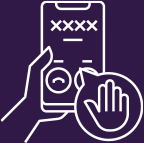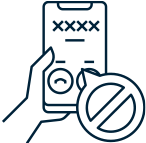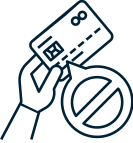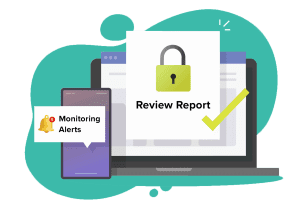Anyone can fall victim to fraud.
Protect yourself and others by staying up to date on the latest scams and learn what to do if you or someone you know has been scammed.
Always remember:

Del-One will NEVER ask for the full card number, expiration date, or the security code.

Del-One will NEVER ask you to move funds to Cash app, Apple Cash, Venmo, PayPal, Zelle, or purchase gift cards or send digital currency such as Bitcoin.

Del-One will NEVER contact you and ask for your personal information, PIN numbers, passwords, account information such as username, and security questions.
How to spot a scam

Scammers pretend to be from an organization or someone you know
They might use a real organization name like the FTC, Social Security Administration, IRS, Medicare, your Financial Institution, or any business, charity, or utility company.

They use familiar communication to trick you
Scammers use technology that can change the phone number that appears on your caller ID using numbers of family members, or even your Financial Institution. This means the name and number you see might not be real. They may also text you from an unknown number pretending to be your Financial Institution.
Scammers also send emails pretending to be an organization or your Financial Institution with a link to a fake website asking for your sign-in credentials.

Scammers will claim there’s an issue or that you won a prize
They may claim you are in trouble with the government, that you owe money, or someone in your family had an emergency. They also may say there’s an issue with your account and that you need to verify information to unlock it. Other scammers will lie and say you won a prize in a lottery drawing or a sweepstakes, but state you have to pay a fee in order to receive the prize.

They pressure you to act fast
Scammers want you to act fast, so you don’t have time to think. If you are on the phone, they might tell you not to hang up, so you can’t confirm if their story or problem is true. They may threaten to sue you, arrest you, or take away your business license. They will say anything to get you to act fast.

Scammers want you to pay them in specific ways
Scammers will ask you to move funds to Cash App, Apple Cash, Venmo, PayPal, Zelle, or purchase gift cards or send digital currency such as Bitcoin. They may also ask you to wire money through wire transfer companies like MoneyGram or Western Union. Some scammers will send you a fake check unbeknownst to you, ask you to deposit it, and then ask you to send them money.
Visit the FTC website here to learn more about other types of scams
How to avoid a scam

Block unwanted calls and text messages. Do not answer calls that are unknown.

Do not give out personal or financial information in response to a request you didn’t expect. If you receive an urgent email or text from a company you do business with, it’s best to not click any links and search directly for their trusted website or phone number to contact them.

Resist the pressure to act immediately. Notice signs of urgency or asking for any personal information. If unsure, HANG UP immediately and contact the company you do business with directly from their trusted website or phone number.
Prevent Identity Theft
Review your full credit report and get free credit monitoring alerts all on your online banking.

I think I've been scammed, what do I do?
Del-One takes our responsibility to protect your personal information very seriously. Please do not hesitate to contact us if you suspect fraudulent texts, calls, or emails from Del-One FCU, please report them immediately. (302) 739-4496
Our team will work with you to determine the next steps.
